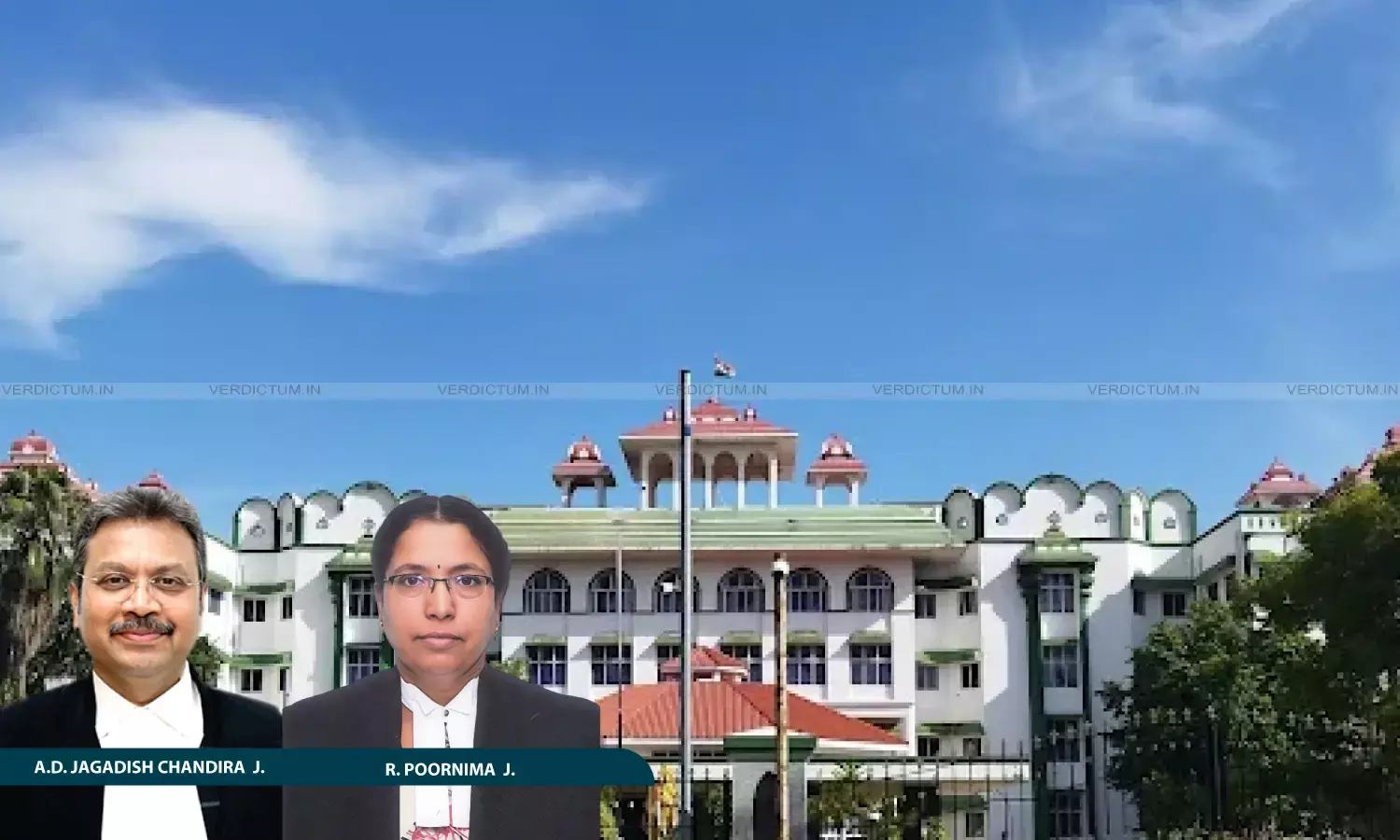Erred In Invoking Presumption U/S.29 & 30 Of POCSO Act: Madras High Court Acquits Accused; Asks Trial Court Judge To Undergo Judicial Training
The Madras High Court was considering a criminal appeal filed under Section 374(2) of the Criminal Procedure Code to set aside the conviction and sentence imposed on the accused.

Justice A.D. Jagadish Chandira, Justice R. Poornima, Madras High Court (Madurai Bench)
The Madras High Court has passed an order directing a Trial Judge to be sent to judicial training for passing a conviction order in a POCSO case where the foundational facts had not been proved by the prosecution. The High Court held that the Trial Court erred in invoking the presumption under Sections 29 and 30 of the POCSO Act.
The High Court was considering a criminal appeal filed under Section 374(2) of the Criminal Procedure Code, to call for the records in a case on the file of the Special Court for Exclusive Trial of Cases under the POCSO Act, 2012, and set aside the conviction and sentence imposed on the appellant.
The Division Bench of Justice A.D. Jagadish Chandira and Justice R. Poornima stated, “We are of the opinion that the learned trial Judge who had convicted the appellant based on the statement recorded from the victim during investigation also needs to be sent for judicial training. We direct the Registry to send the learned trial Judge to State Judicial Academy to attend training programs to understand the fundamental principles of criminal law.”
Advocate S.Prabhu represented the Appellant, while Additional Public Prosecutor A.Thiruvadikumar represented the Respondent.
Factual Background
A father had lodged a complaint at the police station alleging that his minor daughter studying in 10th Standard did not return home till 6 pm one day and despite diligent search in the houses of relatives, she was not found. He had thereby requested the police to find his missing daughter. Based on the complaint a case came to be registered. On October 10, 2022, the victim was produced before the police station by her parents. Since it was late at night, the police asked her to come the next morning. The victim had stated about her love affair with the appellant and also the sexual assault. Thereafter, through the women police, the victim was sent for a medical check-up, and the offence was altered to Section 5(l) read with Section 6 of the POCSO Act.
On completion of the investigation, the trial Court framed charges against the appellant of having committed the offence under Sections 366 of the IPC and Section 5(l) read with Section 6 of the POCSO Act and Section 9 of the Prohibition of Child Marriage Act,2006. The trial court found the appellant guilty of having committed the offences and convicted him. Aggrieved against the judgment and sentence, the appeal came to be filed by the appellant.
Reasoning
The Bench noted that in order to prove the age, the prosecution had relied on a handwritten certificate titled as “School Education Certificate” issued by the Headmistress of NPR Government School, Ayyampalayam. “In Ex.P6 the period of study is shown as 2021-2022. Ex.P6 does not satisfy the requirement under Rule 12 of the erstwhile Juvenile Justice Rules, (which is in pari materia) with section 94(2) of the Juvenile Justice Act, and thus it does not satisfy the requirement under Section 34 (1) of the POCSO Act and Section 94 of Juvenile Justice Act as held in P.Yuvaprakash vs. State rep. By Inspector of Police reported in 2023 SCC Online SC 846 and thereby the age of the victim has not been proved beyond reasonable doubts”, it stated.
The Bench also found out that during the course of investigation, the trial Court had also relied on the statements alleged to have been given by the victim to the doctor, which was entered in the accident register to convict the appellant. The victim, during testimony before the Court, had resiled from the statements and had stated that she had given those statements on the instructions of her father. In the Court during evidence, she had also denied knowing the appellant and denied having been subjected to sexual assault by the appellant.
“From the above we find that there is absolutely no legal evidence to find the accused guilty. When the foundational facts had not been proved by the prosecution the trial Court erred in invoking presumption as under Section 29 and 30 of the POCSO Act. The trial Court without understanding the fundamental principle of criminal law had convicted the appellant and thereby had committed a grave error and illegality”, the Bench stated.
Reference was also made to the judgment in Chinnathambi and another vs. The Inspector of Police (2016) where, in similar circumstances, finding that conviction had been based on statements under Section 161 of Cr.P.C., the Court had lamented about the conduct of the concerned trial Judge and directed the Registry to send the Judge to attend training programs in the Judicial Academy
The Bench thus found no evidence against the accused and also held that the prosecution failed to prove the case beyond a reasonable doubt. Thus, allowing the criminal appeal, the Bench set aside the conviction and sentence and acquitted the appellant of all the charges. “Since the victim has not supported the case of the prosecution and denied having been subjected to sexual assault by the accused she is not entitled for any compensation as ordered by the trial Court. In the event of compensation had been paid to the victim the Government/District Collector concerned to recover the same from her”, it concluded.
Cause Title: Palraj v. The Inspector of Police (Case No.: Crl.A(MD)No.1063 of 2024)

